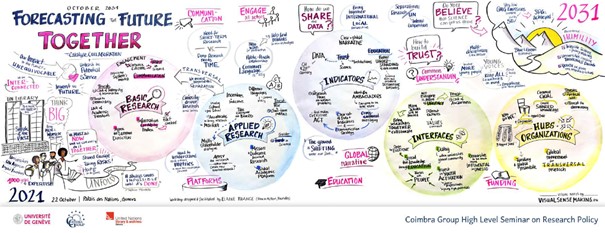The Coimbra Group Meets the United Nations
29 October 2021
Yves Flückiger, Rector, University of Geneva
The University of Geneva has recently organised, in partnership with the Coimbra Group and the United Nations Library & Archives, the high-level research policy seminar on the challenges of the 2030 Agenda. It brought together the rectors and vice-rectors of the Coimbra Group, as well as senior representatives of UN agencies and multilateral organisations.
The University of Geneva, an internationally renowned academic institution ideally located at the heart of Europe and the Geneva-based ecosystem of international organisations, has embraced the 17 UN Sustainable Development Goals (SDGs) as a major transformative force for the next decade. The vision of the University of Geneva is to make the SDGs an institutional compass and a transformative tool for all its major missions and activities. Universal, inclusive and integrated, the SDGs are a call to work in a systemic way, while considering each goal individually.
The first face-to-face Coimbra Group event since the COVID-19 pandemic, the seminar was held at the Palais des Nations, in the heart of International Geneva, thus providing the perfect setting for formal and informal interactions between heads of universities and UN decision-makers.
The event focused on the impact of the UN SDGs on university research and the contribution of academic research to the SDGs, while providing an overview of existing initiatives in the field of science-policy interface with international organisations. The event also offered opportunities to the Rectors and Vice-Rectors of Coimbra Group universities present on site to establish direct contact with high-level decision-makers of Geneva-based UN agencies and discuss possible collaborations.
The programme included a mixture of inspiring presentations, panel discussions as well as an interactive workshop using futures thinking to reverse-engineer from October 2031 to the present day (“October 2031: Forecasting the Future Together”) and in which participants explored risks, challenges and opportunities in the short- and medium-term.
The focus of the working session was on collaboration and what is needed from each other to drive systemic change for an equitable future. Discussions delved into how basic research, applied research, indicators, interfaces, organisations and hubs all serve to support each other’s requirements in closing the science-policy gap.
It was widely acknowledged that it is necessary to build on existing links and collaborations between universities, researchers and UN agencies “start where you are, with what you have!”
This prompted some core reflections around the following questions:
- Do we believe that we can achieve this future in this given timeframe?
- How can we unlock the potential of youth and researchers in our universities?
- How can we include impact investors and unlock more funding for research? Does research follow funding or funding follow research? How can we break down barriers to research, whilst maintaining research integrity?
- How can we work increasingly in multi-disciplinary research teams?
- How can we create a shared, cross-cultural, global narrative that communicates science very clearly to all people to inspire and enable citizen action?
The session was a milestone on the journey of collaboration towards the preferred future laid out for October 2031, with these questions and reflections captured in a visual recording.
Each and every one of us is concerned and must get involved in a joint effort to shaping a better future for all of us. From this point of view, the Coimbra Group has a crucial role to play in promoting concrete initiatives that harness the full potential of its members, all long-established European multidisciplinary universities of high international standard.



